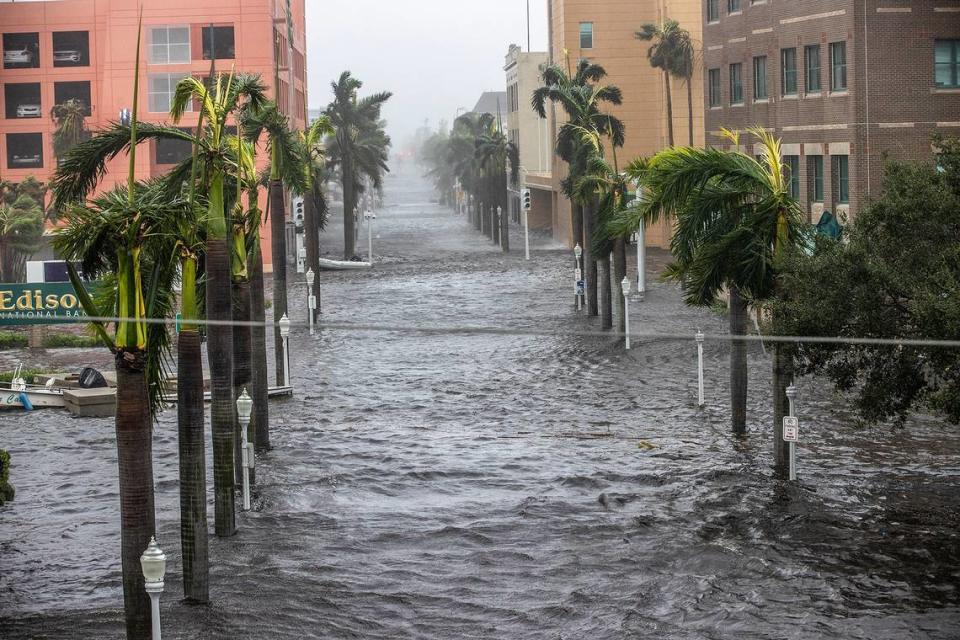Here’s how you can help those in Florida affected by Hurricane Ian’s devastation
Homes and streets submerged. Millions without power. The causeway connecting Sanibel to the mainland in Southwest Florida destroyed.
People are just beginning to get their first glimpse of the devastating destruction Hurricane Ian left behind in Southwest Florida. The Category 4 storm made landfall Wednesday afternoon near Cayo Costa, an island just north of Captiva and off the coast of Fort Myers, before making a second landfall on the mainland, near Pirate Harbor and north of Punta Gorda.
Ian weakened into a tropical storm Thursday as it crossed over Central Florida to the Atlantic, battering parts of the state with heavy rain, gusty winds, “catastrophic flooding” and possible life-threatening storm surge.
Search and rescue efforts are now underway, as crews try to reach people in need who didn’t evacuate ahead of the storm. Officials are checking the safety of roads and bridges and surveying Ian’s damage. Thousands of Floridians have likely lost their homes. Communities will need to rebuild.

READ MORE: ‘Help is on the way’: DeSantis says hundreds have called 911, rescue efforts underway
In times of trouble, people come together to help others out. Some organizations and agencies are already accepting monetary donations to help those impacted by Ian, and more are sure to follow.
Here’s how you can help those affected:
▪ Donate to Florida’s Disaster Fund, which is used to help the state with its response and recovery efforts during emergencies and disasters like Ian. The money raised will be distributed to service organizations that help people affected in the stricken communities. If you don’t want to make a donation online, you can also text DISASTER to 20222.
▪ Catholic Charities, of the Archdiocese of Miami, is accepting monetary donations to help people recover from Ian and is working directly with Catholic Charities on the west coast that are part of the Dioceses of Venice and St. Petersburg. The Miami-area Catholic Charities is also sending staff to assist with recovery efforts.
▪ Feeding South Florida deployed a trailer of food and water to affected areas in Southwest Florida after the Harry Chapin Food Bank warehouse was submerged and made unaccessible. Feeding South Florida is preparing even more meals to deliver.
▪ The Greater Miami Jewish Federation has created a special relief fund to provide aid to those impacted by Hurricane Ian. If you don’t want to make a donation online, you can also make a check payable to the Greater Miami Jewish Federation, 4200 Biscayne Boulevard, in Miami, Florida 33137. Write “Hurricane Ian Relief Fund” in the memo area of each check.
▪ The American Red Cross is accepting monetary donations to help people affected by Hurricane Ian.
▪ Lakeland-based Publix’s nonprofit arm, Publix Charities, is donating $1 million to nonprofit organizations, including the American Red Cross and United Way to help support relief efforts in areas impacted by Ian across Florida. And starting on Sept. 30, Publix customers and employees can make donations at checkout to help people affected by the storm. The funds raised through the companywide donation campaign will go to the American Red Cross.
▪ The Miami Foundation has an online list of on-the-ground organizations, such as community foundations and grassroot organizations, that are ready to provide aid along Florida’s Gulf coast. On their list:
▪ Miami-based Global Empowerment Mission (GEM), which works around the world to respond to disasters, most recently in Puerto Rico and the Dominican Republic, which were devastated by Hurricane Fiona. The organization says it has already deployed teams, loaded trucks with supplies and established partnerships in the affected areas and plans to provide emergency and humanitarian aid, as well as support in reconstruction efforts.
▪ Florida Blue will donate $1 million to general funds of local, regional and statewide nonprofit organizations that will allocate it once storm damage is assessed. Apart from the donation, Florida Blue and Teladoc are offering a no-cost, 24/7 telehealth service that can help with non-emergency conditions — it can be reached a 855-225-5032. A bilingual emotional support helpline has also been launched, which can be reached at 833-848-1764.
▪ Project HOPE has dispatched a team on the ground to visit shelters and health clinics to distribute supplies in addition to assessing health and medical needs.
▪ The Collaboratory, which is collecting funds to support Southwest Florida nonprofits helping people affected by Ian.
▪ AmeriCares, which is collecting funds to help deliver medicine, medical supplies and emergency support to people impacted by Ian.
▪ Save The Children, which plans to deliver “child-focused” items to those who need them in Florida.
▪ All Hands and Hearts, which initially plans to provide help with chain-saw work, mucking, gutting and roof tarping to help communities rebuild.
▪ Florida Rising, which is working with a coalition of organizations to provide disaster relief and recovery to underserved communities to ensure equitable recovery.
This list will be updated as more organizations begin collecting donations.
Avoid donation scams
This is also the time when donation scams will appear, so be cautious of which organization you donate to. If you’re not familiar with their work, research them.
The IRS website has a search feature you can use to check an organization’s ability to accept tax-deductible donations, as well as for information about their tax-exempt status and filings.
People also can look up organizations through websites like the Better Business Bureau, Charity Navigator, and GuideStar. The Better Business Bureau Wise Giving Alliance also has an online post you can refer to with additional tips to help avoid falling prey to a donation scammer.
Miami Herald Reporter Devoun Cetoute contributed to this report.
This article will be updated.

 Yahoo Movies
Yahoo Movies 
